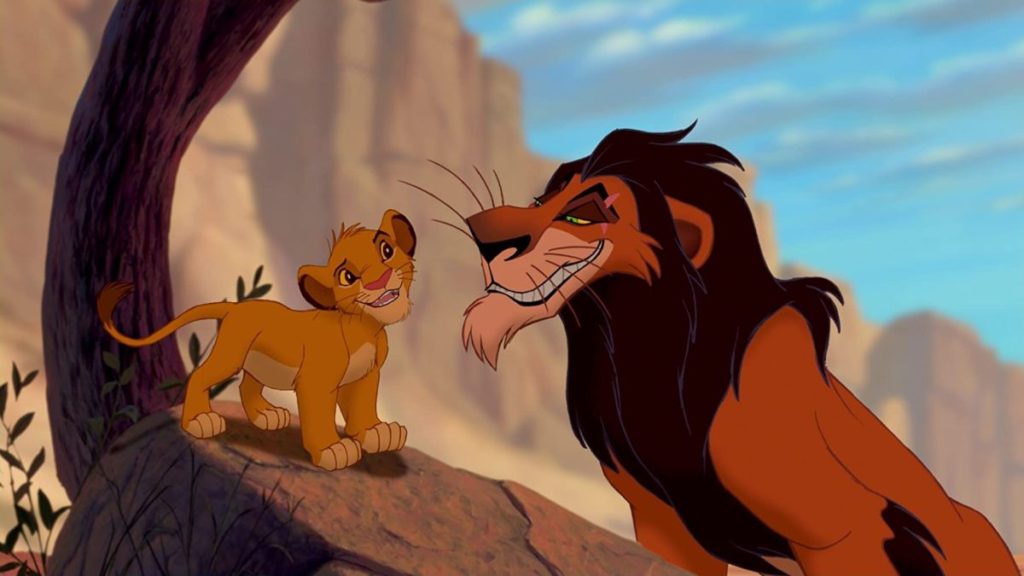There’s a reason why the general census on Jon Favreau’s pointless 2019 revamp of the 1994 Disney animated classic was so derided. You cannot improve on perfection. The Rob Minkoff / Roger Allers original frequently tops lists of Best Animated films, remains to this day the most financially successful hand-drawn animation in history, and holds the ability to reduce people to floods of tears.
Many people are aware that it is a loose adaptation of Hamlet, the basic premise of a vengeful brother killing the king and the son having to step up, but replaced with talking African animals. Simba is Hamlet, Nala is Ophelia, Sirabi is Gertrude, Scar is Claudius, Timon and Pumbaa are Rozencrantz and Guildenstern, Zazu is Polonius, Rafiki is Horatio, and the Hyenas are the stand in for Laertes.
The themes are in usual Disney fashion universal but what The Lion King does better than many other Disney films is to show how we should not let one event dictate our lives. It is, for all the Elton John / Tim Rice songs, the fart jokes and slapstick humour, a story about mental illness and self actualisation.
Related: Filmotomy Podcast 67 – It’s the Disney Movies Show
The idea of Hakuna Matata that Nathan Lane and Ernie Sabella’s Timon and Pumbaa so perfectly warble about is, while incredibly catchy and fun to sing along, not a life lesson. The adage of “no worries” and ignoring a problem is shown to be unhelpful, that in suppressing negative feelings or memories we deny ourselves not only a chance to grow but who we are as people, and that can damage all memories.
Simba, through his guilt shuts himself off to the world, instead brushing off any emotional distress he might go through with Hukuna Matata. Even when confronted by Nala he continues to live in denial and by the flawed mantra his friends give him. Only when Rafiki confronts Simba with a vision of his father, who says that his guilt is destroying his memory of his father does come to understand the truth.
That holding onto self loathing and guilt doesn’t just poison your present and future it begins to erode your memories. Mufasa’s memory exists only to torment Simba because he refuses to try and move past his perceived faults. To get technical if you look at Abraham Maslow’s hierarchy of needs, the lowest basic need is Physiological needs (food, water, warmth, rest), safety needs (security, safety), belongingness & love (intimate relationships, friends), Esteem needs (prestige, feeling of accomplishment) and finally Self Actualisation (achieving one’s full potential).
Related: Filmotomy Podcast 78 – The Pixar Celebration
Simba has the four bases needed, but lacks the part. In confronting Scar, learning the truth of his father’s death and finally defending Pride Rock from him and the Hyenas, he is able to come take his true place as King, as he had wanted to as a child. From the beginning to the end, Simba gains each step towards Maslow’s hierarchy. Finally, as he stands atop the rock he has fulfilled his full potential and proven himself a worthy successor to his father’s legacy.
Not only this, but Simba, through facing his fears and accepting – though misplaced – that he caused his father’s death, he brings improvement to others. The carefree, fearful life that Timon and Pumbaa have give way to confronting the hyenas, their predators and number one threat. They find potential that they didn’t know they had, while Nala and Rafiki, who both found themselves without hope because of Scar, find that they have someone to rally behind.
The sorrow that Rafiki feels when he swipes his hand over the illustration of a baby Simba is juxtaposed when the wind brings news of him still being alive. His elation, and his choice to find Simba show he too is holding on a pain and guilt. His advice, that the past can hurt, but you can either run from it or learn from it, is the true lesson of the film.
Related: Filmotomy Podcast 54 – Rewind to Oscars 1994
If you run, the only person you lie to is yourself, you create a narrative where there is no problem, which stunts growth. But actually, in confronting a problem and accepting the things we cannot change, we grow and become strong more resilient people.
Moreover, the ground work on the themes of death are shown in the speech Mufasa gives about the Circle of Life. That when they die, they become grass, the grass is eaten by antelope, and the antelope are eaten by lions, everything is cyclical. It’s also no coincidence that the greenery and wildlife returns to Pride Rock when Simba takes his place. The balance is restored, and so the circle is complete once more. Death is not permanent, nor is it final, because as we learn from the film, life is a circle and if you seek to find those you miss, you need only look around. If you seek to find your loved ones, you need only look at the world around you.
To this end, the film is about more than happy animated animals singing annoyingly catchy songs by Sir Elton. It’s about what makes us human, just told to us by said animals.
Hakuna Matata.
The Lion King is available to stream on Disney+ or YouTube.

